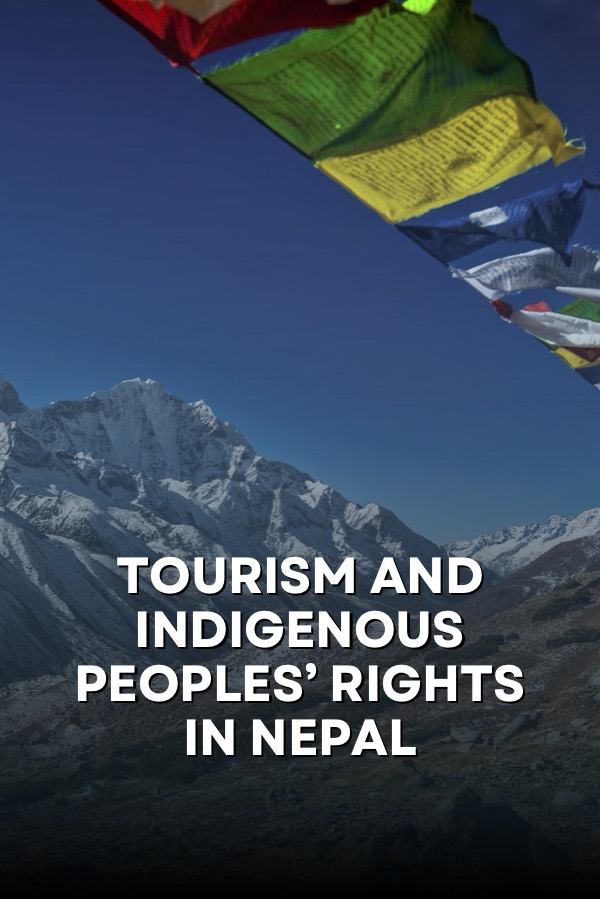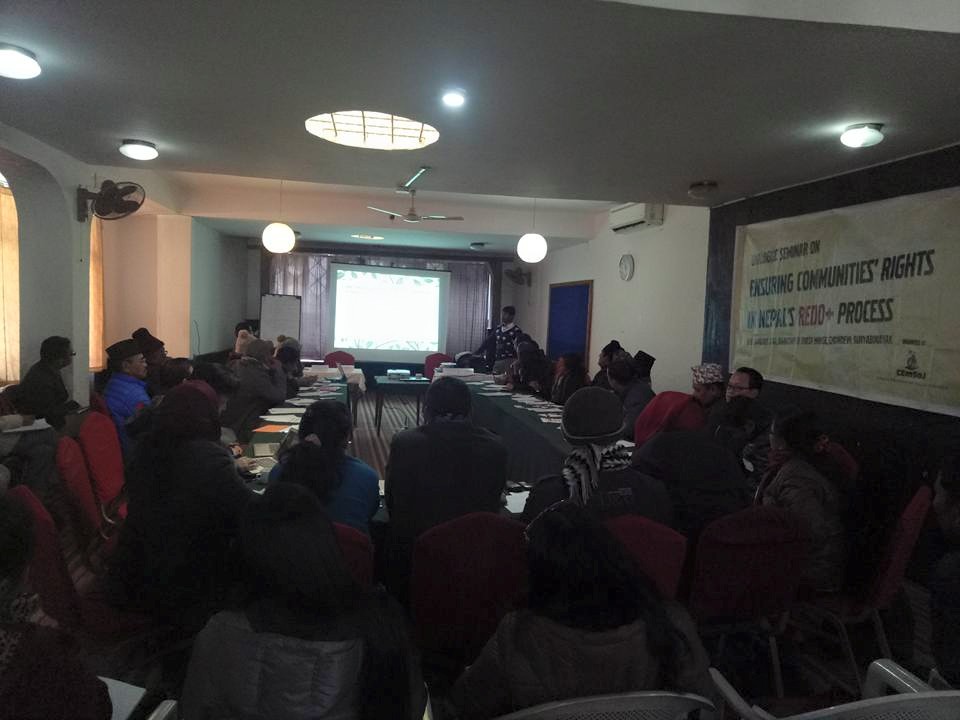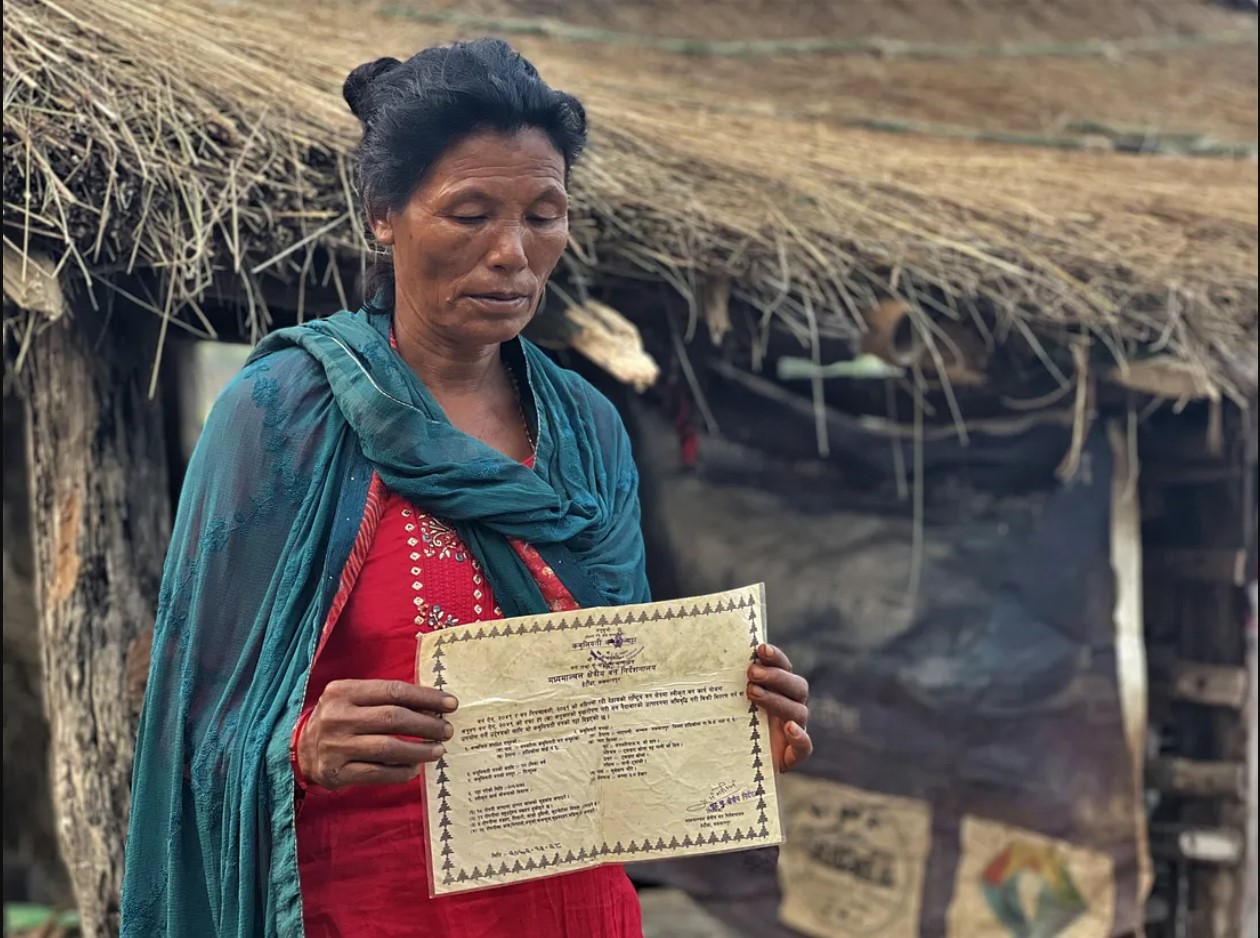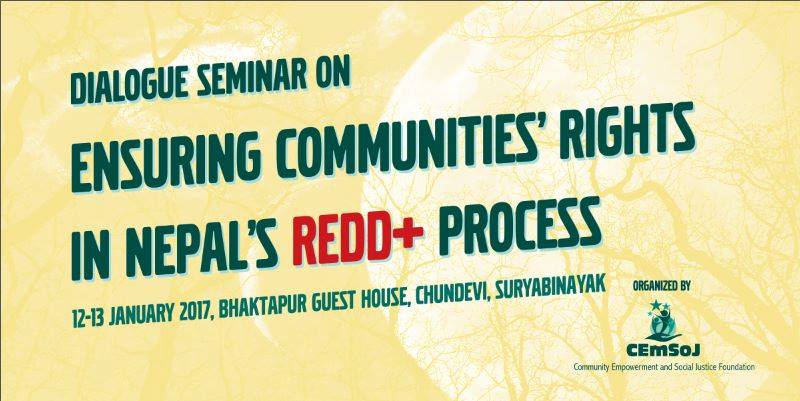This summary report aims to analyze the human rights challenges of Nepal’s endangered Indigenous Bankariya people, particularly to their lands and forest resources, due to Parsa National Park in the south of the country. Traditionally a nomadic group living in forests, Bankariyas were provided six hectares of leasehold forests, where they currently live in informal settlements. The leasehold forests were later incorporated in the buffer zone of the Parsa National Park. Almost two decades later, Bankariyas now face the same challenge as around 6 million people of 34 districts living in buffer zones of various protected areas of Nepal. They do not have titles to the lands that they have been living on, using or occupying for generations. As a result, they face threats of forced evictions and displacement from their current settlement upon expiry of their lease and in lack of land titles.
more “Displaced and Landless: Endangered Indigenous Bankariya living in the buffer zone of Parsa National Park in Nepal”Tag: REDD+
Case Study: Tourism and Indigenous Peoples’ Rights in Nepal
Tourism industry plays and can further play a significant role for Nepal’s economy and prosperity, including in terms of environmental conservation. However, the industry has often entrenched marginalization of Indigenous Peoples in the country and resulted in violations of their rights, including in the context of establishment of protected areas, tourism establishments and businesses as well as representation of Indigenous image.

On many occasions, Indigenous Peoples have suffered loss of traditional lands and other violations of their rights in favor of tourism projects, which directly affects their lives and livelihoods. Particularly relevant is the establishment of protected areas, which have been mostly created by displacing Indigenous communities from their lands and resources. Concerningly, Indigenous communities have even been subjected to wide range of abuses, including killings, torture, arbitrary detentions, mistreatment, harassment as well as sexual violence against women at the hands of army, forest rangers and others in the context protected areas set up for environmental conservation and tourism.
Tourism establishments and business have also encroached upon lands and sacred sites of Indigenous communities in various parts of Nepal. Indigenous defenders and activists have faced retaliations and reprisals for raising their voices against violations of their rights and those of their communities in the context of such tourism undertakings, including at the hands of businesses.
more “Case Study: Tourism and Indigenous Peoples’ Rights in Nepal”Nepal’s Supreme Court directs the government to make legal, policy and implementation arrangements in line with Paris Agreement on climate change
Nepal’s Supreme Court has issued a directive order to the Government to make legal, policy and implementation arrangements in line with the 2015 Paris Agreement on climate change (also referred to as the Paris Climate Accords).
In its decision made dated 27 April on the public interest litigation filed by CEMSOJ, the Supreme Court ruled issued a directive order in the name of the Government to make necessary legal, policy and implementation arrangements in compliance with the commitments of international treaties and conventions, including the Paris Agreement, to conserve the environment, to sell, trade or consume forest products, including carbon, to arrange a fair distribution system of benefits.
more “Nepal’s Supreme Court directs the government to make legal, policy and implementation arrangements in line with Paris Agreement on climate change”सर्वोच्च अदालतद्वारा जलवायु परिवर्तन सम्बन्धि पेरिस सम्झौता लगायतका प्रतिबद्धता अनुकूल हुने गरी आवश्यक कानूनी, नीतिगत तथा कार्यान्वयन व्यवस्था मिलाउन सरकारलाई निर्देशनात्मक आदेश
१ सेप्टेम्बर २०२३, काठमाडौँ
नेपालको सर्वोच्च अदालतले जलवायु परिवर्तन सम्बन्धि पेरिस सम्झौता लगायतका अन्तर्राष्ट्रिय सन्धि सम्झौताका प्रतिबद्धता अनुकूल हुने गरी आवश्यक कानूनी, नीतिगत तथा कार्यान्वयन व्यवस्था मिलाउन सरकारलाई निर्देशनात्मक आदेश जारी हुने ठहर गरेको छ । सामुदायिक सशक्तिकरण तथा सामाजिक न्याय फाउन्डेशन (सेम्सोज)द्वारा दर्ता गरिएको सार्वजनिक सरोकारको रिटमाथि यही बैशाख १४ गते (सन् २०२३ अप्रिल २७) फैसला गर्दै पर्यावरण संरक्षण गर्न, कार्वन लगायत वन पैदावारको माध्यमबाट उत्पादन हुने बस्तु/पदार्थको बिक्री व्यापार, कारोवार गर्न वा उपभोगमा ल्याउन, लाभको न्यायोचि वितरण व्यवस्था मिलाउन तत् सम्बन्धमा जलवायु परिवर्तन सम्बन्धि पेरिस सम्झौता लगायतका अन्तर्राष्ट्रिय सन्धि सम्झौताका प्रतिबद्धता अनुकूल हुने गरी आवश्यक कानूनी, नीतिगत तथा कार्यान्वयन व्यवस्था मिलाउन सरकारको नाउँमा निर्देशनात्मक आदेश जारी हुने ठहर गरेको हो ।
more “सर्वोच्च अदालतद्वारा जलवायु परिवर्तन सम्बन्धि पेरिस सम्झौता लगायतका प्रतिबद्धता अनुकूल हुने गरी आवश्यक कानूनी, नीतिगत तथा कार्यान्वयन व्यवस्था मिलाउन सरकारलाई निर्देशनात्मक आदेश”Dialogue Seminar on Ensuring Communities’ Rights in Nepal’s REDD+ Process organized
13 January 2017, Bhaktapur
CEmSoJ organized a two-day “Dialogue Seminar on Ensuring Communities’ Rights in Nepal’s REDD+ Process in Nepal” in Bhaktapur on 12-13 January 2017 so as to enhance the awareness of the concerned stakeholders and share knowledge among them on the concept of REDD+ and associated practices and impacts.
More than 45 representatives of various stakeholder organizations, including Nepal Federation of Indigenous Nationalities (NEFIN), National Indigenous Women’s Federation (NIWF), Federation of Community Forestry Users Nepal (FECOFUN), Nepal Bar Association (NBA) and environmental lawyers’ groups as well as REDD+ Implementation Center of the Government of Nepal attended the seminar.
Participants of the seminar discussed practices and impacts of implementation of the concept of REDD+ in global context and the current situation of REDD+ implementation in Nepal in the context of the writ petition CEmSoJ had filed in Nepal’s Supreme Court last year for strong safeguards for the rights of indigenous peoples and forest-dependent communities as per international legal standards for designing and implementing REDD+ in Nepal.
 The participants identified the need to undertake greater awareness raising on REDD+ particularly at the community levels, stronger advocacy and litigation for legal reforms to make Nepal’s relevant laws at par international human rights standards including the UN Declaration on the Rights of Indigenous Peoples and put greater attention to specific impacts on indigenous women due to climate change and proposed solutions therefor, among others at the conclusion of the seminar.
The participants identified the need to undertake greater awareness raising on REDD+ particularly at the community levels, stronger advocacy and litigation for legal reforms to make Nepal’s relevant laws at par international human rights standards including the UN Declaration on the Rights of Indigenous Peoples and put greater attention to specific impacts on indigenous women due to climate change and proposed solutions therefor, among others at the conclusion of the seminar.
Climate Change Adaptation Expert Shree Kumar Maharjan, CEmSoJ Chairperson Prabindra Shakya, National Coordinator of NEFIN Climate Change and REDD Partnership Programme Tunga Bhadra Rai, Under Secretary of REDD+ Implementation Center Dr. Mohan Prasad Poudel and Advocate Dil Raj Khanal of FECOFUN delivered paper or presentations on REDD+ Practices and Impacts, Writ Petition filed in Nepal, Climate Change and Rights of Indigenous Peoples, REDD+ Implementation in Nepal and Framework for Carbon Trade in Nepal during the seminar. Kathmandu University School of Law Prof. Prakash KC and Senior Advocate Dr. Chandra Kant Gyawali facilitated and reported on the sessions of the seminar.
नेपालमा रेड प्रक्रिया विरुद्धको रिटमा सर्वोच्चद्वारा कारण देखाऊ आदेश
बुधबार, ६ असोज २०७२
जलवायु परिवर्तनका असर न्यूनीकरणको लागि नेपाल सरकारले कार्यान्वयन गर्दै गरेको रेडप्लस प्रक्रियाले देशको सार्वभौमसत्ता र आदिवासी जनजाति तथा वन आश्रित समुदायको अधिकारमा नकारात्मक असर पार्ने भएकोले रेडप्लस प्रक्रिया बदर गर्न माग गर्दै सर्वोच्च अदालतमा दर्ता गरिएको रिटको आज भएको पहिलो पेशीबाट सर्वोच्च अदालतले सरकारको नाममा कारण देखाऊ आदेश गरेको छ ।
प्रधानमन्त्री तथा मन्त्री परिषद्को कार्यालय, वन तथा भू–संरक्षण मन्त्रालय तथा यस अन्तर्गतका विभागलगायतका सरकारी निकायहरुलाई प्रत्यर्थी बनाई दर्ता गरिएको सो रिटको अन्तिम टुंगो नलाग्दासम्म रेडप्लसको अवधारणा नेपालमा कार्यान्वयन नगर्न नगराउन प्रत्यर्थीहरुको नाममा अन्तरिम आदेश जारी गर्न माग गरिएको थियो । सामुदायिक सशक्तिकरण तथा सामाजिक न्याय फाउन्डेशन (ऋभ्ःक्इव्)को तर्फबाट दर्ता गरिएको हो ।
प्रत्यर्थीहरुको लिखित जवाफ प्राप्त भइसकेपछि अर्को पेशीको मिति तय गरिनेछ । आजको पेशीमा रिटको पक्षमा अधिवक्ता चन्द्रकान्त ज्ञवाली, प्रकाश केसी र सन्तोस राना मगरले बहस गरेका थिए ।
रिट सम्बन्धी थप जानकारीको लागि यहाँ क्लिक गर्नुहोस् ।
Nepal’s Supreme Court issues show cause notice on the writ against REDD+ process
Community Empowerment and Social Justice (CEmSoJ) Foundation
Public Statement
23 September 2015
In its first hearing today on a writ petition demanding annulment of REDD+ process being implemented in Nepal for mitigation of climate change, the Supreme Court has issued a show cause notice to the concerned Government agencies. The petition claims that the process will negative affect the national authority over forests and rights of indigenous and forest-dependent communities.
CEmSoJ filed the writ petition against the Office of the Prime Minister and Council of Ministers, Ministry of Forests and Soil Conservation and the Departments under it, among other Government agencies as defendants. The Foundation had demanded issuance of an interim order to halt implementation of REDD+ processes in Nepal until final decision was made on the case.
Next hearing on the case will be scheduled after written responses are received from the defendants. Advocates Chandra Kanta Gyawali, Prakash KC and Santosh Rana Magar deliberated in the court on behalf of the case in the hearing today.
For more information on the writ petition, click here.
For further inquiries, write to cemsoj@gmail.com
जनताको सार्वभौमसत्ता र आदिवासी अधिकार विरुद्ध भएको भन्दै नेपालमा रेडप्लस प्रक्रिया रोक्न सर्वोच्चमा रिट, पहिलो पेशी आज
मंगलबार, ५ असोज २०७२
जलवायु परिवर्तनका असर न्यूनीकरणको लागि नेपाल सरकारले कार्यान्वयन गर्दै गरेको रेडप्लस तयारी प्रक्रियाले देशको सार्वभौमसत्ता र आदिवासी जनजाति तथा वन आश्रित समुदायको अधिकारमा नकारात्मक असर पार्ने भएकोले रेडप्लस प्रक्रिया बदर गर्न माग गर्दै असोज १ गते शुक्रबार सर्वोच्च अदालतमा रिट दर्ता गरिएको छ ।
प्रधानमन्त्री तथा मन्त्री परिषद्को कार्यालय, वन तथा भू–संरक्षण मन्त्रालय तथा यस अन्तर्गतका विभागलगायतका सरकारी निकायहरुलाई प्रत्यर्थी बनाई दर्ता गरिएको सो रिटको अन्तिम टुंगो नलाग्दासम्म रेडप्लसको अवधारणा नेपालमा कार्यान्वयन नगर्न नगराउन प्रत्यर्थीहरुको नाममा अन्तरिम आदेश जारी गर्न माग गरिएको छ । सामुदायिक सशक्तिकरण तथा सामाजिक न्याय फाउन्डेशन (CEmSoJ)को तर्फबाट दर्ता गरिएको सो रिटको पहिलो पेशी असोज ५ गते मंगलबार हुनेछ ।
मानव चाप र अव्यवस्थित औद्योगिकरणबाट सिर्जीत प्रदुषणको बृद्धिसँगै प्राकृतिकरुपमा चल्दै आएको वायुमण्डलीय चक्र असन्तुलन हुनु र मौसमको स्वरुपमै अप्राकृतिक रुपमा परिवर्तन देखा पर्नुलाई जलवायु परिवर्तन (Climate Change) भनेर बुझिन्छ । जलवायु परिवर्तनले गर्दा विगतको तुलनामा केही वर्षयता हिमालमा हिउँ घेरै पग्लेको, पातलो हिउँ पर्ने, बेमौसममा दर्के पानी परेर बाढी–पहिरो आउने साथै अनावृष्टि, अतिवृष्टि र खण्डवृष्टिले गर्दा बाली, नालि तथा उत्पादन आदिमा क्षति हुने जस्ता असरहरु देखा परेका छन् ।
वायुमण्डलमा कार्वन डाइअक्साइडजस्ता हरित गृह (Green House) ग्याँसहरुको अध्यधिक चापले उत्सर्जनले भू–तापमान बृद्धि (Global Warming) हुनु जलवायु परिवर्तनको मुख्य कारण हो । इन्धन र कलकारखाना हरित गृह ग्याँस उत्सर्जन गर्ने प्रमुख कारकहरु हुन् । तथापि इन्धन उत्खनन र खपत कम गर्नु वा कलकारखाना वातावरण मैत्री बनाउनमा जोड दिनु सट्टा जलवायु परिवर्तनको प्रभाव न्यूनीकरणका प्रमुख उपायहरुमध्ये हाल विकासशील देशहरुमा वन फडानी र वन विनासबाट हुने कार्वन उत्सर्जनको कटौती (Reducing Emissions from Deforestation and Forest Degradation) लाई लिन थालिएको छ, जसलाई छोटकरीमा रेड (REDD) भनिन्छ । रेड अवधारणामा थप परिमार्जन गर्दै वनको प्रभावकारी संरक्षण, दिगो व्यवस्थापन र जन सम्बद्र्धनका उपायहरुलाई समेत समेटेर पछिल्लो समयमा यसलाई रेडप्लस (REDD+) भन्न थालिएको छ ।
रेडप्लस अवधारणा अन्तर्गत विश्व बैंक समेतको संलग्नतामा संयुक्त राष्ट्रसंघीय कार्वन व्यापार आयोजना (UN carbon offset scheme) अन्तर्गत सन् २००० र २०१० को बीचमा अफ्रिका, एसिया, दक्षिण अमेरिका र क्यारिवियनका करिब ५० करोड एैकर (acres) भूमि विदेशी सरकार वा बहुराष्ट्रिय संस्थानहरुको पक्षबाट अधिग्रहण वा सम्झौता गरिएको छ । यसले गर्दा विश्वको कृषियोग्य भूमि र वनको स्वामित्व शक्तिशाली लगानीकर्ता तथा संस्थानहरुमा एकक्रित हुने क्रम दु्रतरुपमा बढिरहेको छ । त्यस्ता सम्झौताहरुमा प्राय धनी विकसित देशहरुमा निर्यात गर्ने उद्देश्यले निर्यातजन्य बाली वा जैविक इन्धन उत्पादन गर्ने गरिन्छ जसबाट जैविक विविधता मासिने हुन्छ र परिणामस्वरुप आदिवासी जनजाति लगायत वनमा आश्रित समुदाय तथा साना किसानहरु तिनका भूमिबाट विस्थापित भएका छन् र तिनले आफ्नो आयश्रोत गुमाएका छन् । यी यस्ता असरहरुका बावजुद ती असरहरुको सम्बोधन गर्न प्रभावकारी व्यवस्था नभए तापनि नेपाललगायत विकासशील देशहरुमा रेडप्लस तर्जुमा र कार्यान्वयन दु्रतगतिमा बढिरहेको छ ।
रेडप्लस तयारी प्रक्रिया अन्तर्गत नेपाल सरकारले अन्तर्राष्ट्रिय सहयोगमा राष्ट्रिय संरचना निर्माण गरी अनुगमन, अभिलेखीकरण र प्रमाणीकरण तथा अध्ययन एवं अनुसन्धानका साथै क्षमता अभिबृद्धि गर्न तालिम, क्षेत्रीय गोष्ठी तथा अन्तरक्रिया कार्यक्रमहरु गदै आएको छ । यसै क्रममा थुप्रै राष्ट्रिय, क्षेत्रीय र स्थानीय परामर्श कार्यशालापश्चात् नेपाल सरकारले २०७० साल माघ २३ गते राष्ट्रिय रेडप्लस रणनीति (National REDD Plus Strategy for Nepal)को मस्यौदा सार्वजनिक गरेर सुझाव संकलन गरिरहेको छ । ती कार्यशाला तथा कार्यक्रमहरु बढी प्राविधिक कर्मचारी संयन्त्र केन्द्रिकृत भएको र तिनमा सामुदायिक वन उपभोक्ताका प्रतिनिधित्व न्यून र आदिवासी जनजातिका प्रतिनिधिको सहभागिता अझ न्यून रहेको विभिन्न अध्ययनहरुले देखाएको छ ।
रेडप्लस अवधारणाको कार्यान्वयनबाट नेपालका वनजंगल, भूमि लगायतका श्रोतसाधन अन्तर्राष्ट्रिय बजारमा आधारित कार्वन व्यापारको लागि उपलब्ध गराइँदा राष्ट्र र जनताका यी सम्पत्ति विश्व बैंकजस्ता अन्तर्राष्ट्रिय संस्था तथा बहुराष्ट्रिय र निजी कम्पनीको नियन्त्रण र अधीनमा जाने प्रबल सम्भावना भएकोले नेपाली जनतामा निहित सार्वभौमसत्तामा नै प्रश्न चिन्ह खडा हुने भन्दै रेडप्लसको प्रकृया उत्प्रेषणको आदेशद्वारा बदर गरी पाउन माग गरिएको छ ।
नेपालमा रेडप्लस प्रक्रिया अघि बढाइने भए रेडप्लस सम्बन्धी संरचनामा समानुपातिक समावेशी सिद्धान्तको आधारमा आदिवासी जनजाति, दलित, महिलालगायतका समुदायको अर्थपूर्ण सहभागितको सुनिश्चितता गर्न, रेडप्लस सम्वन्धी नीतिहरु बनाउँदा तथा सम्पूर्ण प्रक्रियाको क्रममा नेपाल सरकार पक्ष राष्ट्र रहेको अन्तर्राष्ट्रिय श्रम संगठनको आदिवासी जनजाति सम्बन्धी महासन्धि नं. १६९ (ILO C169), आदिवासी जनजातिको अधिकारसम्बन्धी संयक्तु राष्टसंघीय घोषणापत्र (UNDRIP) तथा जलवायु परिवर्तन सम्बन्धी संयुक्त राष्ट्रसंघीय महासन्धि (UNFCCC) लगायतमा व्यवस्था गरिएको आदिवासी जनजातिका अधिकार कार्यान्वयन गर्न आवश्यक आदेश जारी गर्न पनि माग गरिएको छ ।
रेडप्लस रणनीति तर्जुमा गर्ने लगायतका सम्बन्धित प्रक्रिया नेपालको भूमि सम्बन्धी ऐन, २०२१ र वन ऐन, २०४९ मा आधारित रहेको हुनाले यी कानूनको लागि नेपाल पक्ष राष्ट्र रहेको आदिवासी जनजातिका मानव अधिकार सम्बन्धी अन्तर्राष्ट्रिय कानुनी दस्तावेज अनुरुप पार्न बृहद् छाता ऐन बनाउन परमादेश लगायतको आज्ञा आदेश जारी गर्न पनि निवेदकले माग गरेका छन् ।
रिटको पूर्ण पाठको लागि यहाँ क्लिक गर्नुहोस् ।
थप जानकारीको लागि, सम्पर्क cemsoj@gmail.com
REDD+ process challenged in Nepal’s Supreme Court, First Hearing Today
Community Empowerment and Social Justice (CEmSoJ) Foundation
Public Statement
Tuesday, 22 September 2015
A writ petition has been filed at Supreme Court on Friday demanding annulment of REDD+ process being implemented in Nepal for mitigation of impacts of climate change. The petition claims that the process will negatively impact the national authority over forests and rights of indigenous and forest-dependent communities. First hearing of the petition is scheduled for today.
Community Empowerment and Social Justice (CEmSoJ) Foundation filed the writ petition with the Office of the Prime Minister and Council of Ministers, Ministry of Forests and Soil Conservation and the Departments under it, among other government agencies as defendants. The Foundation has demanded issuance of an interim order to halt implementation of REDD+ processes in Nepal until final decision is made on the case.
Population growth and uncontrolled industrialization have caused imbalance in the natural atmospheric and weather cycles, which is known as climate change. In recent years, excessive melting of snow in the mountains, bursting of glaciers, occurrence of floods and landslides due to heavy rainfall against regular weather cycles have been occurring as a result of climate change.
Increase in the amount of carbon dioxide, which is the major greenhouse gas, in the atmosphere that is resulting in global warming is the main cause of climate change. Use of fossil fuels (petroleum, gas and coal) for factories, means of transport and other works causes emission of carbon dioxide in a large quantity. However, instead of addressing the source of emissions by reducing extraction and consumption of fossil fuels and making factories environment-friendly, Reducing Emissions from Deforestation and Forest Degradation (REDD) in developing countries is currently being taken as a major measure of minimizing impacts of climate change. Lately, the REDD concept has been further refined and called REDD+ incorporating measures of effective conservation, sustainable management and public promotion of forests.
Under UN carbon offset schemes as per REDD+ concept, with involvement of World Bank, between 2000 and 2010, a total of 500 million acres of land in Asia, Africa, Latin America and the Caribbean was acquired or negotiated under deals brokered on behalf of foreign governments or transnational corporations. Many such deals are geared toward growing crops or biofuels for export to richer, developed countries – with the consequence that smallholder farmers are displaced from their land and lose their livelihood while local communities go hungry. The concentration of ownership of the world’s farmland in the hands of powerful investors and corporations is rapidly accelerating.
UN studies had projected risks of various human rights violations and destruction of biodiversity as a result of developing countries undertaking massive land concessions to multinational companies in order to attract foreign investments under REDD+ concept. Such impacts of REDD are now already occurring. Despite such impacts, developing countries, including Nepal, are rapidly embarking on policy formulation and implementation of REDD without any effort to effectively address those impacts.
Nepal is among those countries that are currently undergoing a REDD+ Readiness process with considerable amount of international support. Under its REDD+ Readiness Preparation Proposal, Nepal has formed a national REDD+ structure and undertaken monitoring, documentation and verification programs as well as studies and research along with capacity building trainings, regional conferences and interaction workshops. Following number of national, regional and local consultation workshops, Nepal’s Government has made public a National REDD Plus Strategy for Nepal and has been collecting suggestions on the strategy.
Nepal’s institutional REDD+ planning structure is highly dominated by techno-bureaucratic top-down practices representing government interests and international donors’ requirements. According to various reports, there has been little participation of community forest user groups’ representatives and negligible participation of indigenous peoples’ representatives. This is despite legal provisions in line with Free, Prior and Informed Consent requirements as prescribed by REDD+ decisions under the United Nation’s Framework Convention on Climate Change (UNFCCC).
There is strong likelihood that Nepal’s forests, lands and other resources, which are properties of the nation and people, will go under the control and authority of international institutions such as the World Bank and multinational and private companies when those resources are made available for international market based carbon trade under implementation of REDD concept. That can raise question on the sovereign powers and state authority inherent in the people of Nepal. Thus, the writ petition demands for annulling the entire REDD+ process through a certiorari mandamus.
However, if REDD+ process is to be carried on, the writ petition calls for issuance of necessary appropriate order or warrant to the defendants for ensuring meaningful participation of indigenous peoples, Dalits, women and other groups on the basis of principles of proportional inclusion in REDD+ related structures and for complying with ILO Convention 169, UN Declaration on the Rights of Indigenous Peoples, UNFCCC and other relevant instruments in course of formulating REDD+ related strategies and policies and the entire process.
Further, the writ petition demands issuance of appropriate mandamus to carry out necessary study to annul or revise Nepal’s Land Act, 1964 and Forest Act, 1993 that are the basis of Nepal’s REDD+ related process since those laws are not in line with international human rights standards of indigenous peoples.
For draft translation of the writ petition, click here.
For further inquiries, write to cemsoj@gmail.com

